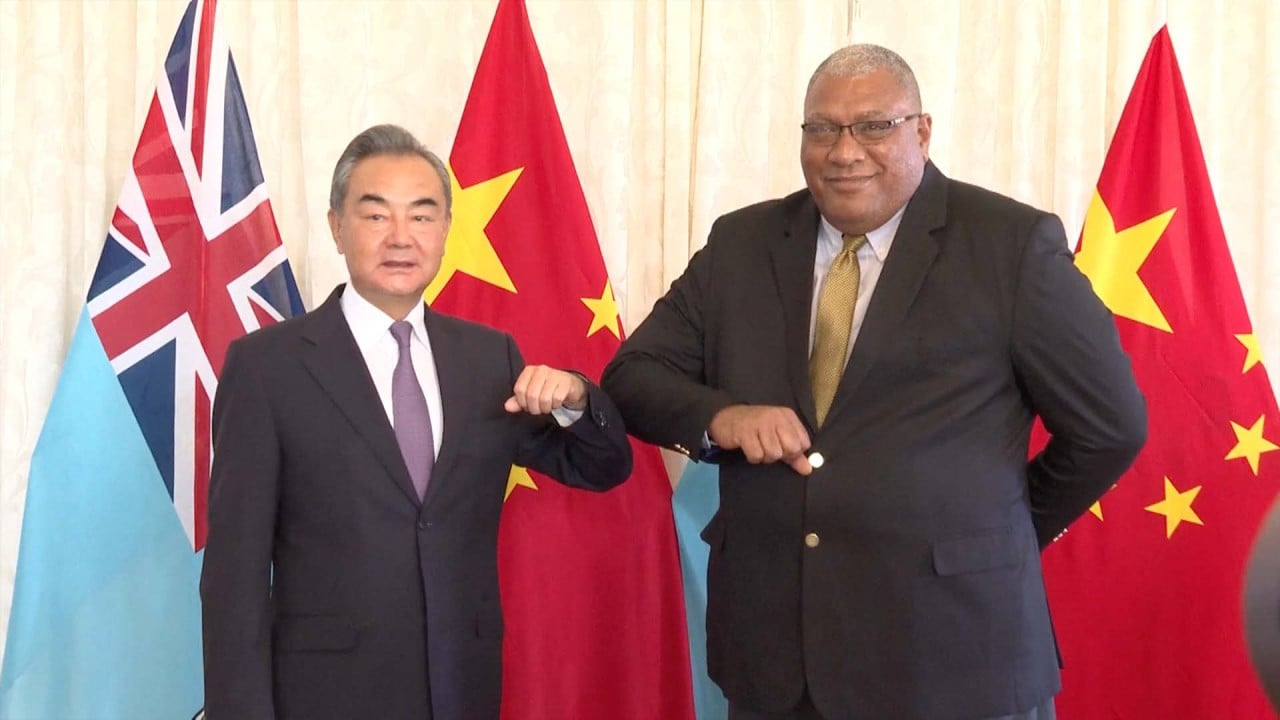
01:59
China’s proposed security deal with Pacific islands falls short as Wang Yi tours region

Australia, caught off guard by the recent security pact between the Solomon Islands and China, has yet to recover from Beijing’s charm offensive in the Pacific island nations.
China, which last month sent Foreign Minister Wang Yi on a 10-day tour of the South Pacific, has put forward wide-ranging proposals – including a regional security deal – in the hope of rallying 10 Pacific island nations into developing an interconnected cooperative environment based on mutual respect and expanding geoeconomic relations.
But Australia, yet to shed its colonial mindset, sees China’s venture into the Pacific as an encroachment into its backyard.
The government of new Prime Minister Anthony Albanese has tried to soften the edges of its predecessor’s foreign policy by presenting itself as an overnight reformist, prepared to engage in dialogue rather than dictating to its smaller neighbours.
Through its initiatives in the Middle East and Africa, China has shown a willingness to maintain cordial relations with all countries. This model is being replicated in the Pacific to help rejuvenate infrastructure and lift economic standards.
Unfortunately, Australia appears determined to contest the legitimacy of Chinese efforts in the region, with little more than fear and propaganda to spread about China’s practical infrastructure and security initiatives.
For years, Australia had been throwing its weight around the South Pacific. The former Morrison government spoke of “coercion” in the region and the need to prepare “for war”. New Foreign Minister Penny Wong, while saying the region should determine its own security, urged Pacific island nations to consider the “consequences” of China’s security offers.
Most of the South Pacific islands have been independent for at least 40 years, the last 10 of which Wong has described as “a lost decade”, particularly on climate action, an issue that cuts to the heart of island survival. Australia had chosen symbolic gestures and feeble investments over more tangible initiatives, failing to heed its island neighbours’ economic, climatic, infrastructural and defence needs.
With the rise of China and Russia’s second coming, developing countries that have seen the wealth divide widen between themselves and the developed world are starting to see Beijing and Moscow as practical alternatives for a prosperous future.
China’s attempt to have cordial relations with everyone is not so much the catalyst driving countries to seek Chinese investment and input into their development. Instead, it is very much the arm-twisting and nascent colonial attitudes that have seeped nauseatingly into the 21st century.
It is in the assumption of the heirs apparent that the developing world does not know what is in its best interests, and the imposition of their ideals through symbolism and boomerang aid – an Australian expression for money that ends up in the pockets of consultants and companies that deliver the aid projects.
In decrying the Solomon Islands for crossing a geostrategic red line by signing a security deal with China, Australia came across like America’s deputy sheriff, chastising a subordinate for disobedience.
Even in the madness running up to the Australian election, there was no public attempt by either the outgoing Morrison government or the Australian security establishment to assess the policy failings that contributed to the Solomon Islands’ move.
Former foreign minister Marise Payne denied reports that she had been aware the deal was brewing well beforehand but failed to prioritise it – a characteristic trait of Australia’s relations with its Pacific neighbours.
Australian heads of government have the third-lowest attendance rate at the Pacific Island Forum Leaders Meeting, at 67.4 per cent, with only the Solomon Islands and Palau having a worse record. On the other hand, New Zealand’s attendance record of 88.4 per cent reflects that it considers the region a priority.
A cornerstone of Australia’s relations with the Solomon Islands was a 2003 peacekeeping mission, when the country began falling into civil unrest, which ended in 2017. Most of this aid was in the form of the Regional Assistance Mission to the Solomon Islands (RAMSI), which helped prevent conflict.
As the situation improved, aid funding decreased by 35 per cent per year on average under the coalition government compared with the previous Labor government, which provided an average of A$171.7 million (US$119 million) and A$228.5 million per year respectively.
Yet, even this aid was not a cash injection into security infrastructure; money pledged to the Solomon Islands was spent on services provided by the Australian Federal Police and their security consultants.
The Australian security establishment needs to look beyond empty words and hollow gestures, and stop its virtue signalling to Pacific nations by constantly claiming the moral high ground over China.
Had these investment initiatives come from the United States, Canberra would probably have been full of praise. But, because it’s China, the deep-rooted bias and Cold War mentality prevent Australia from seeing the bigger picture, which is the betterment of the Pacific island community.
Sameed Basha is a defence and political analyst with a master’s degree in international relations from Deakin University, Australia